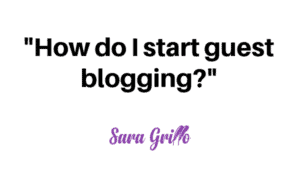Podcast: Play in new window | Download
From the perspective of someone who is both a CFA® charterholder and a businesswoman, I’m going to talk about how CFA® charterholders can use not necessarily just their credential but the experience that they have been through to get new clients and to develop new business for themselves. Here are some rare, practical, actionable tips for financial advisors who are CFA® charterholders.
For those of you who are new to my blog/podcast, my name is Sara. I am a CFA® charterholder and I used to be a financial advisor. I have a weekly newsletter in which I talk about financial advisor lead generation topics which is best described as “fun and irreverent.” So please subscribe!
Let’s get on with the blog!
You’re Way Tougher Than You Think You Are
This is something I messed up with in my own life when I was younger and got laid off from Lehman Brothers.
I (kind of) had a little bit of an entitled attitude where I felt like because I had the designation jobs should come easily to me, that people when they saw it would just pick me for the job.
Well, boy was I wrong.
No fault of the CFA designation itself, it was really my attitude. The first thing is, understand that in order to get the CFA designation you have to be pretty tough. I mean, there are always those whiz people who will say it was a breeze. Fine – this podcast is not for you. Go listen to someone else’s show. For most of us, the process was grueling and took a fair amount of determination and mental tenacity.
I know for myself, I was an English major. When I decided early in my career that I wanted to take the exam and become a portfolio manager, I met with alot of resistance. One person even said, “But Sara, you’re just a marketing girl. This is a finance exam.” Well, I’m the kind of person that if you tell me I can’t do something, it just makes me want to do it more.
Maybe I was just too naive to know any better, but even to this day I’m just not willing to accept what other people determine to be my limits. Understand that if you’ve been through this process, the same probably applies to you to some extent. To go through the exams, you’ve probably been through a fair amount of mental testing and you’ve had to have alot of perseverance to get there.
Now, I feel like many people kind of let this fall of when they get the designation and get into their practice. For many of us this is where the high determination ends. I think it may have something to do with our pride. When you are going for the exam, there’s all this hype about it. Everyone is asking you. There’s alot you have to swallow by telling people you failed. It’s public. So naturally that increases our motivation.
But what about your business? I know when I was a financial advisor, I was underperforming. I was not a great marketer. I passed the exam and from then on failed to go about developing my business as an advisor with the same tenacity.
Bring back that same determination. Do you know what it takes to get past the FRA material in the derivatives section? McCaulay vs. Modified duration. Remember the fair value accounting rules? Think about how you were punching the bag so hard.
Don’t let go of that. That is #1 of my tips for financial advisors who are CFA® charterholders. It’s a little bit abstract, but just hearken back to the days when you had a fire in the belly to pass the exam and understand how tough you really are.
I remember I told a reporter once that if it took me 80 years, it was going to say “Sara Grillo, CFA” on my tombstone. I wish I had been able to apply the same tenacity to the work I was doing at that point in developing leads for my business as a financial advisor.
Bring Back the Rigor
Take the discipline and translate it into action. Here are the kinds of things you should be doing to create more opportunity for yourself by taking action.
Think about the kinds of incredible actions you had to take to pass the exam. You see people studying all day on Saturday, telling their friends and family they can’t see them for days and weeks at a time. I remember once I went to Italy with my family and I had that book attached to my hip. Every single time we were waiting for a bus or at the airport, I cracked open the book and I was studying. It was those Schweser notes.
One night I was studying put-call parity and there was a blackout. I lit a candle so that I could study by candle light. In my episode Shoot the Ball, I talk about how much activity you really should be taking if you are in a business development role and you want to get new clients.
If you are a business owner or salesperson, there’s really no way to get around the numbers. In a way it is just as much of a test as the CFA exam. At the end of the day, you have to ring the bell and in order to ring that bell there is a certain amount of knocking on doors you have to do. You can’t get around it.
I have a call recorder sheet that tracks the amount of calls you should be making each day and the results of each. Contact me about that because at the end of the day it really does come down to how many people you get in front of.
This is perhaps the most valuable of my tips for financial advisors who are CFA® charterholders – take daily action. I’ve noticed in my own business that regardless of skill level, the advisors I coach who do the best in getting new clients are the ones who take the most action.
Trust recognition – the best of all tips for financial advisors who are CFA® charterholders
I have found in my businesses that CFA® charterholders do like to do business with each other. It’s kind of this tacit understanding that we have. I do personally feel like I can trust another CFA charterholder more than the average financial advisor when it comes to managing money for a few reasons.
- One, they are bound to a code of ethics and if they break it then they get all they worked for taken away. After going through the painful process to get this, nobody want to lose it.
- Two, there are some pretty tough questions on the ethics section of the exams. Just by virtue of the fact that you had to study this material, I feel a CFA charterholder has had training that goes way beyond the common level of knowledge.
If you’re a financial advisor, look for other charterholders who aren’t in the money management business and who respect the designation. Marketing people, salespeople, government employees, there’s alot of us; not everyone is out there cracking trades every day. There are in fact hundreds of thousands of people out there who are CFA® charterholders . I think they are more likely to connect with you than they would be with the average advisor.
It’s also a good position to be in to be someone’s Plan B. Even if the charterholder is managing their own money, everyone needs a back up that can be called upon if something happens to them.
Although the CFA is widely recognized within certain business communities, to the average retail person, they’re looking for CFPs when it comes to personal financial advice. Many people don’t grasp the real differences between CFPs, CFA® charterholders , and CPAs. Be able to explain this.
The designation is more recognized among certain very educated business populations such as attorneys, MBAs, and accountants. Often these people socialize with other educated people and know someone who has been through the program.
That’s the third of my tips for financial advisors who are CFA® charterholders!
Utilize CFA Social Media Resources
The CFA Institute has done a great job creating a spectacular online presence for itself and its members. Use it.
For the fourth of my marketing tips for CFA® charterholders, I suggest using LinkedIn groups that you can join because you are a CFA Institute member. I used to post into the CFA Candidates Group which has over 180k members and a great deal of business came of it.
Create CFA Charterholder Specific Financial Products
Now, we all know that CFA® charterholders tend to be investment focused people. But are they as psyched about financial planning?
Nope.
Why doesn’t somebody create a financial product, a course or a financial planning service, targeted towards CFA® charterholders who already have the investment side covered? Don’t just offer the generic financial planning service that everyone else offers. Why don’t you put a twist on it and say, okay so I’m not managing your money but here are some things about your investments that you might want to be looking at. Have your beneficiaries changed? Is the risk tolerance on your account still correct?
Or even better, offer to be a second set of eyes and review their investments on an annual basis? Don’t try to take away the investment side when the person wants to manage it themselves. You’ll just annoy them and breach their trust. There’s alot of value in being that back up. You just never know when things could change and the person says, “I’m so tired of this. I don’t have time anymore.”
Hint: people are more motivated to hire a money managers after they mess up. We’re in a long bull market but once the next 20% correction happens, some people might kind of be open to your advice. This is one of the most surprising tips for financial advisors who are CFA® charterholders – be in the right position.
Be a Guest Writer
Financial Analysts Journal, CFA Institute Enterprising Investor.
These are all publications offered by the CFA Institute and to my knowledge they do welcome submissions from CFA® charterholders . True, mostly other CFA® charterholders will be reading it, but you never know when that CPA or estate attorney may be reading.
And by the way, write about being a CFA charterholder on your own blog. Go past just stating that you hold the designation. Explain the value specifically in terms of the experience that the client has that they would not have if you didn’t have the designation.
Example: Write a blog about something like this.
When I was a candidate for the CFA exam, I studied extensively the ethics section because I had to answer questions about things like client confidentiality. Here was an example of the kind of question I had to answer (present some example of someone overhearing something in a restaurant or something).
In other words, one of the best marketing tips for CFA® charterholders is to show the substance of your training. Show people the kinds of concepts you had to master in order to score well enough to be awarded the designation. This will make them grasp what it really means to be dealing with someone with higher awareness of certain things, things like confidentiality that matter to them, and how their experience as your client may be better as a result.
Tap Into Millennial CFA Candidates
Use the CFA Candidate pool which is full of what we call HENRYs to get in front of high earning millennials or GenXers who may not have the portfolio right now but probably will in the future. There’s a CFA Candidates group and Analyst Forum has discussions about this as well. Whenever I talk about how to pass the exam on my YouTube channel people gobble this content up and that is because people are voracious about getting this advice.
Understand that not every CFA candidate is going to come out on top. Yes, I said it. Some people are going to die off after they fail Level Two a million times. Someone who you make contact with when they are a candidate and who later fails out is potentially a great candidate for your services. Some will pursue portfolio management careers despite having flunked out of the program while others will go work selling pharmaceuticals. Hardworking, intelligent, motivated – these are great potential clients. Sounds good to me!
If you’re trying to meet millennials, which you should be, check out my “How to Talk to Millennials So They Actually Listen” about how to do that.
Summary on tips for financial advisors who are CFA® charterholders
I hope you enjoyed my blog about marketing tips for financial advisors who are CFA® charterholders. But that’s not all there is to it!
Here is my exclusive content for financial advisors who want to get new clients using social media:
- Learn what to say to prospects on social media messenger apps without sounding like a washing machine salesperson. This e-book contains 47 financial advisor LinkedIn messages, sequences, and scripts, and they are all two sentences or less.
- If you want a financial advisor marketing plan template, check out my e-book.
- You could also consider my financial advisor social media membership which teaches financial advisors how to get new clients and leads from LinkedIn.
Thanks for reading. I hope you’ll at least join my weekly newsletter about financial advisor lead generation.
See you in the next one!





